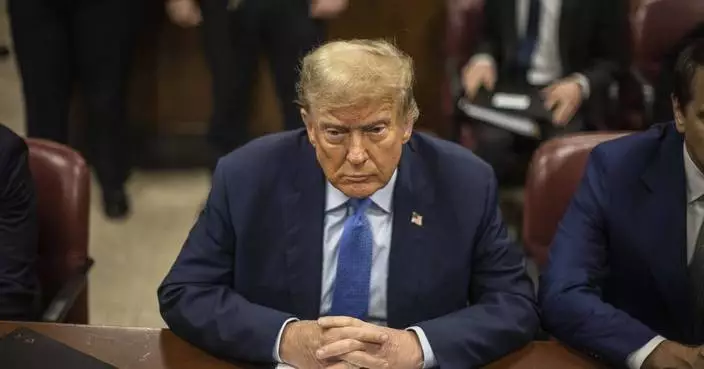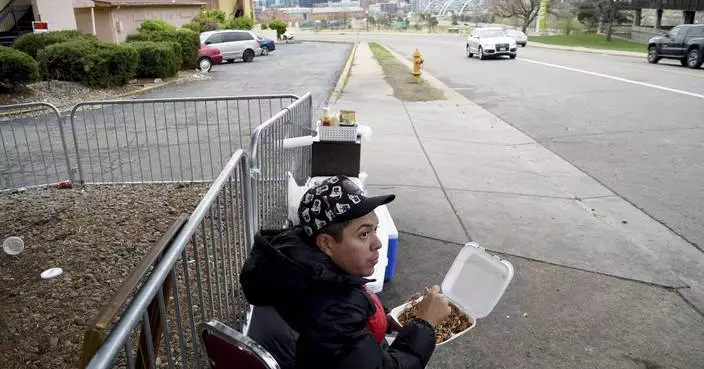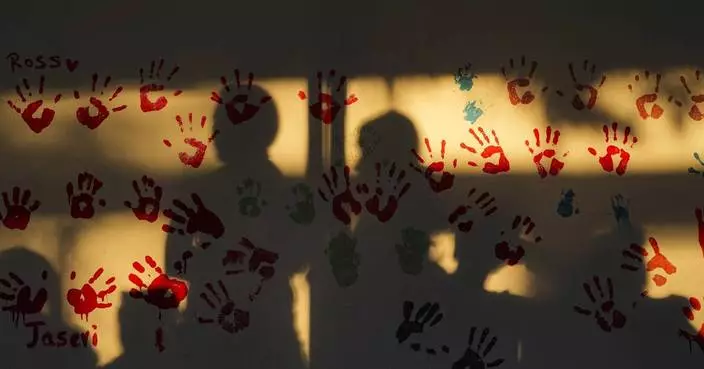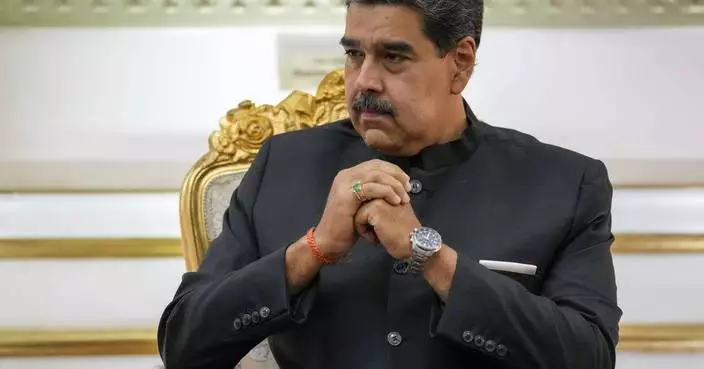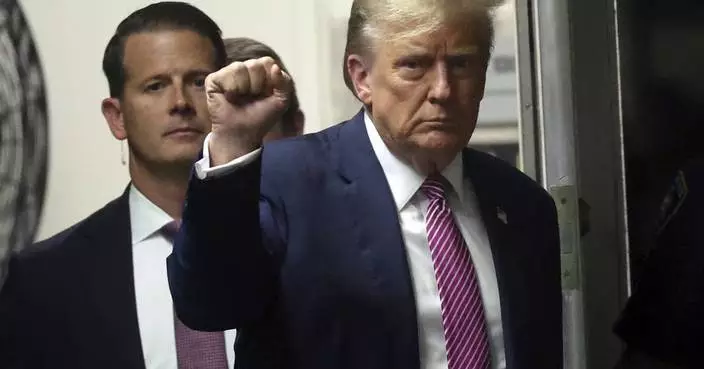The State Department’s top official on Venezuela said Tuesday that the Trump administration will continue recognizing lawmaker Juan Guaidó as the nation’s interim president even if President Nicolás Maduro's government ousts the opposition from control of congress — its last major stronghold.
“He will not change the legal status for many countries around the world — and especially for us,” Trump’s special representative to Venezuela, Elliott Abrams told the U.S. Senate’s Committee on Foreign Relations in a hearing on Venezuela Tuesday.
Maduro’s government has set a Dec. 6 election to renew the National Assembly. As the body’s leader, Guaidó last year claimed the nation’s presidency, arguing that Maduro's reelection had been fraudulent, in part because top opposition figures had been banned.

State Department Special Representative for Venezuela Ambassador Elliott Abrams appears before a Senate Foreign Relations Committee hearing on Capitol Hill in Washington, Tuesday, Aug. 4, 2020. (AP PhotoAndrew Harnik)
Guaidó and more than two dozen opposition parties recently announced they will boycott the vote, saying Maduro's government has already manipulated the process, in part by imposing new leaders on the key parties allowed to take part, making the upcoming election a “fraud.” Their elected term will end in the first week of January.
“In our view the constitutional president of Venezuela today and after Jan. 5, 2021 is Juan Guaidó,” Abrams said.
The U.S. is among more than 50 nations that have recognized Guaidó as interim leader, saying the nation’s presidency is vacant because Maduro’s rule is illegitimate.
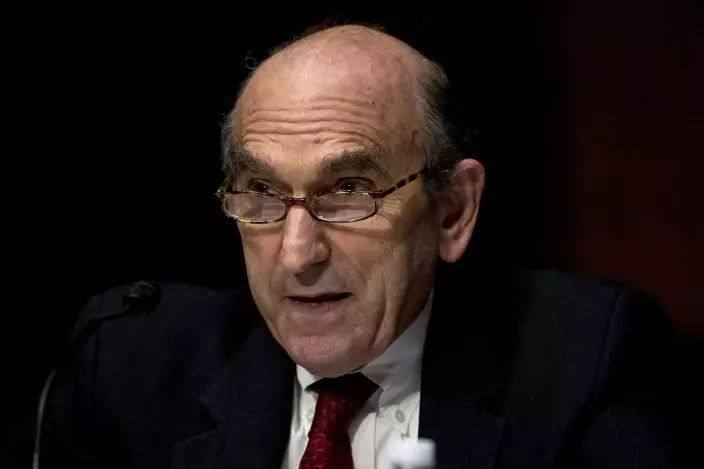
State Department Special Representative for Venezuela Ambassador Elliott Abrams testifies at a Senate Foreign Relations Committee hearing on Capitol Hill in Washington, Tuesday, Aug. 4, 2020. (AP PhotoAndrew Harnik)
However, 18 months later, Maduro remains in control of the nation with backing from key international allies like Russia, China, Cuba and Iran. He also has backing from Venezuela’s military.
U.S. lawmakers gave scathing criticism of how the U.S. handled efforts to help Venezuela cast off Maduro’s authoritative government and return the once-wealthy oil nation to democratic rule.
“Our Venezuela policy over the last year and a half has been an unmitigated disaster,” said Sen. Chris Murphy, a Democrat from Connecticut. “If we aren’t honest about that, then we can’t self-correct.”

State Department Special Representative for Venezuela Ambassador Elliott Abrams prepares to testify at a Senate Foreign Relations Committee hearing on Capitol Hill in Washington, Tuesday, Aug. 4, 2020. (AP PhotoAndrew Harnik)
Murphy said the rushed U.S. policy has allowed Maduro to label Guaidó an “American patsy” while hardening Russian and Cuban backing of Maduro.
An estimated 5 million Venezuelans have fled shortages of gasoline, food and a broken healthcare system that is showing signs of buckling as the new coronavirus surges.

State Department Special Representative for Venezuela Ambassador Elliott Abrams takes off his mask to testify at a Senate Foreign Relations Committee hearing on Capitol Hill in Washington, Tuesday, Aug. 4, 2020. (AP PhotoAndrew Harnik)
SAN FRANCISCO (AP) — If it feels like TikTok has been around forever, that's probably because it has, at least if you're measuring via internet time. What's now in question is whether it will be around much longer and, if so, in what form?
Starting in 2017, when the Chinese social video app merged with its competitor Musical.ly, TikTok has grown from a niche teen app into a global trendsetter. While, of course, also emerging as a potential national security threat, according to U.S. officials.
On Wednesday, President Joe Biden signed legislation requiring TikTok parent ByteDance to sell to a U.S. owner within a year or to shut down. It's not clear whether that law will survive an expected legal challenge or that ByteDance would agree to sell.
Here's how TikTok came to this juncture:
ByteDance is founded in China by entrepreneur Zhang Yimin. Its first hit product is Toutiao, a personalized news aggregator for Chinese users.
Startup Musical.ly, later known for an eponymous app used to post short lipsyncing music videos, is founded in China by entrepreneur Alex Zhu.
Musical.ly hits #1 in the Apple App Store, following a design change that made the company's logo visible when users shared their videos.
ByteDance launches Douyin, a video sharing app for Chinese users. Its popularity inspires the company to spin off a version for foreign audiences called TikTok.
ByteDance acquires Musical.ly for $1 billion. Nine months later, ByteDance merges it with TikTok.
Powered by an algorithm that encourages binge-watching, users begin to share a wide variety of video on the app, including dance moves, kitchen food preparation and various “challenges” to perform, record and post acts that range from serious to satirical.
Rapper Lil Nas X releases the country-trap song “Old Town Road” on TikTok, where it goes viral and pushes the song to a record 17 weeks in the #1 spot on the Billboard Hot 100 chart. The phenomenon kicks off a wave of TikTok videos from musical artists who suddenly see TikTok as a critical way to reach fans.
TikTok settles federal charges of violating U.S. child-privacy laws and agrees to pay a $5.7 million fine.
The Washington Post reports that while images of Hong Kong democracy protests and police crackdowns are common on most social media sites, they are strangely absent on TikTok. The same story notes that TikTok posts with the #trump2020 tag received more than 70 million views.
The company insists that TikTok content moderation, conducted in the U.S., is not responsible and says the app is a place for entertainment, not politics.
The Guardian reports on internal documents that reportedly detail how TikTok instructs its moderators to delete or limit the reach of videos touching on topics sensitive to China such as the 1989 Tiananmen Square protests and subsequent massacre, Tibetan independence or the sanctioned religious group Falun Gong.
U.S. politicians begin to raise alarms about TikTok's influence, calling for a federal investigations of its Musical.ly acquisition and a national security probe into TikTok and other Chinese-owned apps. That investigation begins in November, according to news reports.
The Pentagon recommends that all U.S. military personnel delete TikTok from all phones, personal and government-issued. Some services ban the app on military owned phones. In January, the Pentagon bans the app from all military phones.
TikTok becomes the second-most downloaded app in the world, according to data from analytics firm SensorTower.
Privacy groups file a complaint alleging TikTok is still violating U.S. child-protection laws and flouting a 2019 settlement agreement. The company “takes the issue of safely seriously” and continues to improve safeguards, it says.
TikTok hires former Disney executive Kevin Mayer as its chief executive officer in an apparent attempt to improve its U.S. relations. Mayer resigns three months later.
India bans TikTok and dozens of other Chinese apps in response to a border clash with China.
President Donald Trump says he is considering banning TikTok as retaliation for China's alleged mishandling of the COVID-19 pandemic.
Trump issues a sweeping but vague executive order banning American companies from any “transaction” with ByteDance and its subsidiaries, including TikTok. Several days later, he issues a second order demanding that ByteDance divest itself of TikTok's U.S. operations within 90 days.
Microsoft confirms it is exploring acquisition of TikTok. The deal never materializes; neither does a similar overture from Oracle and Walmart. TikTok, meanwhile, sues the Trump administration for alleged violation of due process in its executive orders.
Joe Biden is elected president. He doesn't offer new policy on TikTok and won't take office until January, but Trump's plans to force a sale of TikTok start to unravel anyway. The Trump administration extends the deadlines it had imposed on ByteDance and TikTok and eventually lets them slide altogether.
Newly sworn-in President Joe Biden postpones the legal cases involving Trump's plan to ban TikTok, effectively bringing them to a halt.
TikTok announces it has more than a billion monthly active users.
A Wall Street Journal report finds TikTok algorithms can flood teens with a torrent of harmful material such as videos recommending extreme dieting, a form of eating disorder.
TikTok announces new rules to deter the spread of harmful material such as viral hoaxes and promotion of eating disorders.
“The Unofficial Bridgerton Musical,” a project created by two fans of the Netflix show as a TikTok project, wins the Grammy for Best Musical Theater Album.
TikTok becomes the most downloaded app in the world, beating out Instagram, according to SensorTower data.
BuzzFeed reports that China-based ByteDance employees have repeatedly accessed the nonpublic information of TikTok users, based on leaked recordings from more than 80 internal TikTok meetings. TikTok responds with a vague comment touting its commitment to security that doesn't directly address the BuzzFeed report.
TikTok also announces it has migrated its user data to U.S. servers managed by the U.S. tech firm Oracle. But that doesn't prevent fresh alarm among U.S. officials about the risk of Chinese authorities accessing U.S. user data.
FBI Director Chris Wrap raises national security concerns about TikTok, warning that Chinese officials could manipulate the app's recommendation algorithm for influence operations.
ByteDance also said it fired four employees who accessed data on journalists from Buzzfeed News and The Financial Times while attempting to track down leaks of confidential materials about the company.
The White House gives federal agencies 30 days to ensure TikTok is deleted from all government-issued mobile devices. Both the FBI and the Federal Communications Commission warn that ByteDance could share TikTok user data with China’s authoritarian government.
Legislators grill TikTok CEO Shou Zi Chew at a six-hour congressional hearing where Chew, a native of Singapore, attempts to push back on assertions that TikTok and ByteDance are tools of the Chinese government.
TikTok said it was restricting a tool some researchers use to analyze popular videos on the platform.
A bill to ban TikTok or force its sale to a U.S. company gathers steam in Congress. TikTok brings dozens of its creators to Washington to tell lawmakers to back off, while emphasizing changes the company has made to protect user data. TikTok also annoys legislators by sending notifications to users urging them to “speak up now” or risk seeing TikTok banned; users then flood congressional offices with calls.
The House of Representatives passes the TikTok ban-or-sell bill.
The Senate follows suit, sending the bill to President Biden, who signs it.

FILE - A TikTok sign is displayed on their building in Culver City, Calif., March 11, 2024. If it feels like TikTok has been around forever, that's probably because it has, at least if you're measuring via internet time. What's now in question is whether it will be around much longer — and if so, in what form. (AP Photo/Damian Dovarganes, File)








